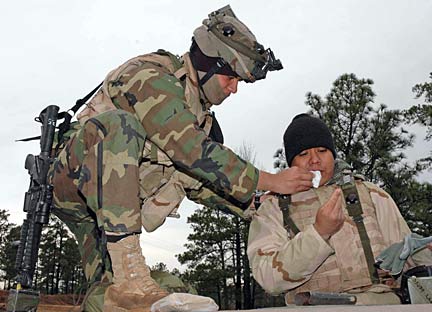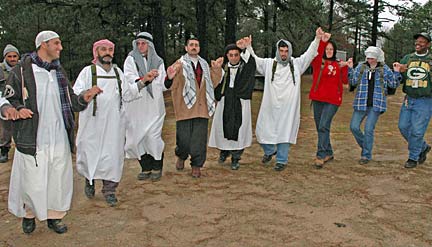CRAM FOR TOUR

Spc. Clement Kaimiola offered first aid yesterday to Pvt. Carlo Bio, who cut his lip while training at Fort Polk, La. They are both members of the 29th Infantry Brigade's 2nd Battalion.
29th ready for
ultimate test
Isle soldiers at Fort Polk will put
lessons to use to survive in Iraq
FORT POLK, La. » Hawaii's citizens soldiers have kept a furious pace in the past several weeks as they get ready for a one-year tour of duty in Iraq.
On assignment
Star-Bulletin military reporter Gregg K. Kakesako is in Fort Polk, La., the last training stop for the citizen-soldiers of the Hawaii's 29th Infantry Brigade before they head to Iraq in the next few weeks.
|
But one thing is certain: Hawaii will be in their minds as they pack their duffel bags and then toss them onto an Army transport bound for Iraq.
"The hardest part is leaving home, family and friends, and everything you have been used to," said Spc. Tony Thairathom, a mechanic assigned to the 29th Brigade Support Battalion, and a McKinley High School graduate.
Spc. Kazuo Kaneshiro, 21, who worked at his family's Boyd's Fish Market in Nanakuli, says he's ready after difficult weeks of training.
His all-weather jacket just arrived, and a good thing, too. During training in Texas, even his Gatorade drink froze.
"Pulling guard duty at Camp McGregor was miserable," he said. "It was like in the 20s."
He hasn't been the only one trying to get used to miserable mainland weather. More than 2,200 soldiers from the Hawaii Army National Guard Division and the Pacific Basin areas have been training at Fort Polk as members of the 29th Infantry Brigade.
From here they'll fly to Kuwait, and then by convoy to Iraq for 12 intense and dangerous months. To get them ready, the Army is spending $10 million over three weeks and hiring people to play Iraqi roles so the soldiers can get a feel for what to expect.
One of those helping the Army is Akram Hussain, a Kurd whose father, eight sisters and one brother live in the northern Iraqi city of Zaxo. For the past four years, Hussain has been helping train soldiers at Fort Polk, one of the Army's top training facilities.

The Army has hired people to play Iraqi roles so the soldiers can get a feel for what to expect. Here, Iraqi citizens at the village of Tikira at Fort Polk's Joint Readiness Training Center perform a wedding dance.
At a 1,000-acre training facility in Fort Polk, Hawaii's soldiers also have been playing many parts. In one mission they're asked to protect the water treatment plant in the Iraqi city of Madelsar, which is attacked by insurgents armed with small arms, rocket-propelled grenades and other explosives. In another "city," soldiers protect a power plant from insurgents.
News from Iraq underscores the importance of their training. As the Hawaii soldiers make their final preparations, they can't help but notice the major news of the day spread across the front pages of Louisiana newspapers: Six Army National Guard soldiers have been killed in Iraq.
And so they train. They're taught to constantly be aware of their surroundings and suspicious activity. It might sound almost too cryptic, but soldiers seem to understand Brig. Gen. Mick Bednarek, commanding general of the operations group at the Joint Readiness Training Center, when he tells them that it's not "only the presence of the abnormal, but the absence of what is normal" that will help keep them alive.
And each other.
First Lt. Mike Caraang, an Iolani School athletic trainer, said most of his training here has helped him be a better leader. He's qualified to be an Army medic, "but to be a leader in the Army Guard goes beyond just patient care," he said.
The final test, of course, will be Iraq. There's no final exam, no final grades.
The ultimate test, soldiers know, is staying alive.
www.dod.state.hi.us/hiarng/
[News] [Business] [Features] [Sports] [Editorial] [Do It Electric!]
[Classified Ads] [Search] [Subscribe] [Info] [Letter to Editor]
[Feedback]
